
Background information
Dragon Quest VII Reimagined looks amazing
by Kevin Hofer

I was able to try Digimon Story: Time Stranger, currently set for release on 3 October at a preview event. I was particularly taken with the development of Digimon and the abstract story. Despite several points of criticism, I really want to play the finished game.
Admit it, Digimon’s better than Pokémon. We all know it. Now, I know hordes of Pokémon fans, including my eight-year-old son, would vehemently disagree with me. But I stand by my opinion. My first point of contact with the franchise was with the anime, not the video game. I just preferred the premise of children fighting their trauma with digital monsters by their side over that of the young adventurer looking to become a Pokémon master.
All the more surprising then that I never found my way into the video game series – unlike with Pokémon. But after playing Digimon Story: Time Stranger, this’ll definitely change. Even if I don’t think it’s perfect.
In Time Stranger, you play a secret agent in Tokyo who witnesses a catastrophe that could destroy the entire city. Suddenly, you travel eight years into the past. With knowledge of the future, you have to uncover the secret surrounding the impending tragedy. Your actions have to change the world and reshape history. You’ll visit alternate timelines as well as the digital world – a parallel reality in which Digimon live. Even better, you can make friends with them and train them as battle partners.
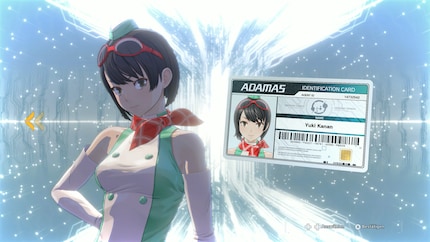
The story looks promising for now, and I can hardly wait to play the finished game – Digimon games apparently excel in terms of storytelling. However, I do have one major concern about this.
All important story dialogue is voice acted – except for my heroine’s words. Mind you, she doesn’t say much anyway: you can choose answers from time to time, but others usually do the talking. It seems strange to me that the person I’m playing would remain silent. In my first few minutes of play time, I really struggled to identify with her – even if I chose her answers.
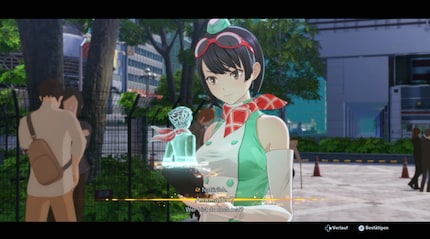
At the preview event, I got to play the start of the game. The operator, a holographic figure, provided me with tips and background information on the events in the Shinjuku district, which I was then allowed to explore. However, there wasn’t much to see there: you traverse several locked-off passages and can only speak to a few characters. NPCs with no dialogue lack a face. Creepy, they look like mannequins.
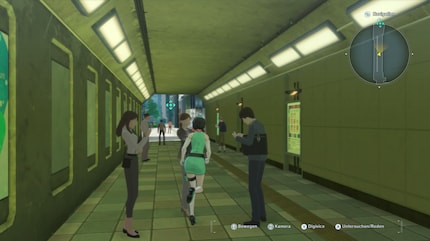
The visuals didn’t knock my socks off in the first few minutes either. I got the feeling many assets were copy-pasted several times, and the streets of Shinjuku feel very similar. This also goes for later passages in a subway shaft and an administration building. Given the expected scope of the game, however, I can overlook this. From what I’ve seen in trailers, individual sections offer a lot of variety when compared directly at least. In any case, Time Stranger looks much better than any Pokémon game and ran smoothly on a Bandai Namco PC.
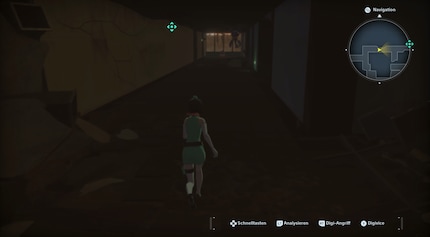
The turn-based combat in Time Stranger is based on the rock-paper-scissors principle. Certain digital monsters resist attacks from certain species and are weak against others. In Digimon, the three main attributes are Data, Vaccine and Virus. Virus corrupts Data, Data overwrites Vaccine and Vaccine cures Virus. A Digimon of a certain attribute usually learns moves of that attribute. Four further attributes have no strengths or weaknesses compared to the others. There are also elementary strengths and weaknesses such as Fire, Ice and Steel.
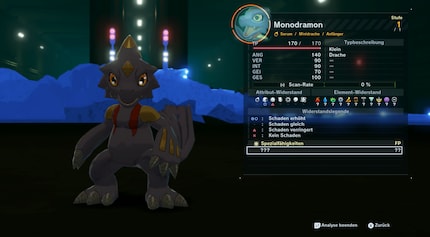
The system is easy to understand, and I quickly got used to it. When coming across a new Digimon, you have to do some detective work using the analysis feature to find out its strengths and weaknesses. Once I adjusted to this, battles usually went much quicker. This also applied to the one boss I fought. Compared to the regular enemies, he simply took more punishment. Remember, it’s important to always have at least one Digimon with you for every conceivable situation. I hope a more tactical approach will emerge as the game progresses. Otherwise, it’ll just degenerate into simple Digimon swapping and slapping around opponents.
Speaking of swapping Digimon, you can swap one of your three digital monsters for one in reserve at any time. It doesn’t even cost a turn, same for using items. Why? Simple: the player is doing this as a partner of their Digimon, not they themselves – if that makes sense.
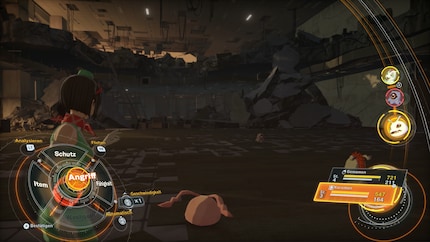
Naturally, you can also capture convert Digimon. You just have to beat them several times, increasing your scan rate for that specific critter. If this reaches 100 per cent, you can convert that data into a Digimon. However, I’d advise patience. The closer that rate is to the maximum 200 per cent, the stronger the realised creature.
The time this takes depends on the Digimon. You’ll only have to defeat Koromon about four times to get the scan rate up to 200 per cent. Usefully, you don’t even have to switch to the battle screen every time. Digimon move freely through the world, and you can knock out weaker specimens directly without having to enter battle.
Mind you, not every Koromon is created equally. Digimon have different character traits, which affect their stats. These can change through conversation and thus grow in a certain direction.
Speaking of growth: digitation can make your digital monsters stronger. To do this, they must fulfil certain requirements, which vary from Digimon to Digimon. Conversely, the beasts can also de-digitise, turning them into a different species. However, they also have to meet certain requirements for this.
This also varies in time depending on the Digimon. For example, I couldn’t digitise my starter Gomamon during the preview event. Instead, I transformed the Koromon I caught later into an Agumon – my absolute favourite Digimon from season one of the series.
I’m looking forward to the opportunities this’ll open up. I just love trying out different things. Alongside the story, it could well be the highlight of the game for me. Finally, the Digifarm ensures that Time Stranger doesn’t end in a lengthy grind. There, Digimon can train and grow on their own. I could’ve tried it out in a second sequence later in the game. Unfortunately, I didn’t have enough time since I arrived late to the preview event – my train had been cancelled.
Even though I didn’t have much time with Digimon Story: Time Stranger and had to note some flaws, I’m really looking forward to the game. The world and story that await make me hungry for more. And experimenting with different Digimon has a very special appeal for me.
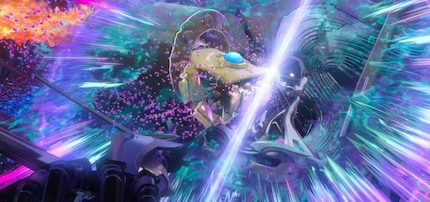
I particularly like the fact that even as a newcomer, I quickly found my way around the game. I hope the fights won’t be too dull and easy in the end, and that the main character grows a bit more personality. I’ll find out on 3 October at the latest, when the game comes out.
Digimon Story: Time Stranger will be released on 3 October 2025 for PS5, Xbox Series X/S and PC. Bandai Namco invited me to their preview event in Frankfurt and covered my travel expenses.
From big data to big brother, Cyborgs to Sci-Fi. All aspects of technology and society fascinate me.
Interesting facts about products, behind-the-scenes looks at manufacturers and deep-dives on interesting people.
Show all